News
Geometric Gin: The new local gin made using grapes
Tuesday, September 5th, 2017There’s been a flurry of gin-related activity recently, with new gin bars, and artisan spirits popping up like crazy, but one new local brand is making waves with a gin of a different kind. Gin-thusiast Kate Liquorish took it upon herself to investigate.
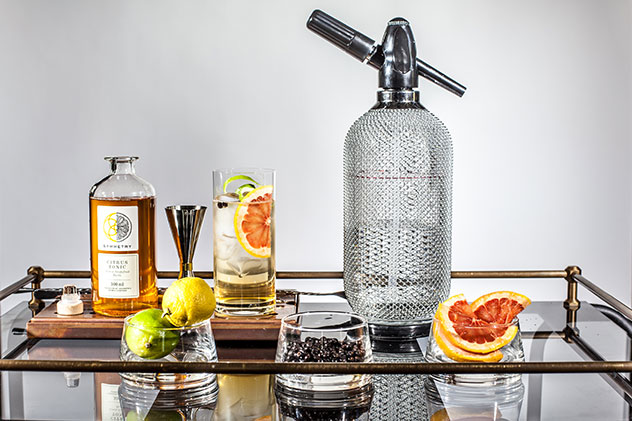
Geometric Gin is a new locally made gin, distilled from grapes. Photo supplied.
Jean-Baptiste Cristini is one of those privileged few whose hobby has become his occupation. From the age of 14 he had an absolute fascination with wine, and going to boarding school in Burgundy only deepened the obsession. After school he studied and worked in Burgundy and Champagne for just over a decade, all the while experimenting with brewing, bottle-fermentation, foraging and crafting cocktails.
On returning to Cape Town in 2013, Jean-Baptiste was intrigued to find that craft beers were all the rage, so felt less need to make his own brew. “I love aromatics and perfumes. I had an absolute passion for the Negroni and noticed that spirits were rather pricey in store, so why not make my own? I had a friend in Woodstock with a small distillery and I wanted to make gin, but I wanted to make mine using grapes.”
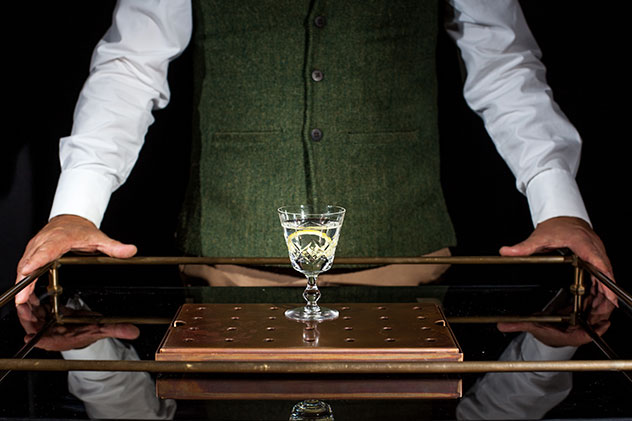
Martini, anyone? Photo supplied.
Grape-based gin pays homage to SA brandy
Grapes, you say? Gin is ordinarily made using a neutral grain spirit and, in SA, often a neutral cane spirit. So why did Jean-Baptiste decide to use a neutral wine spirit?
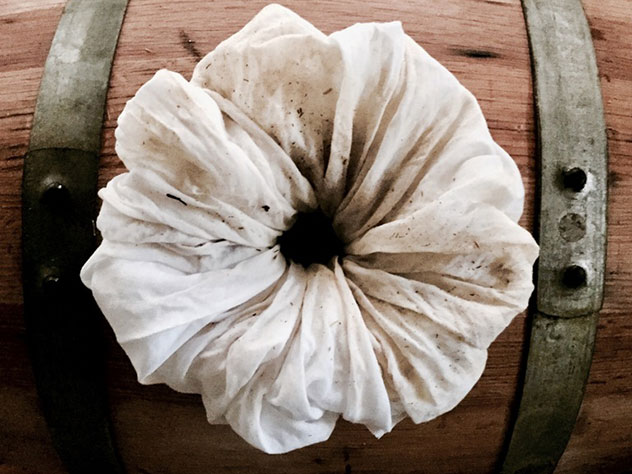
Filtering a barrel of vermouth with muslin. Photo supplied.
“Cane spirits and grain spirits work well for gin because they are neutral,” he explains. “Grape spirit [is] less so. Even though my grape spirit is very neutral, you can’t make it completely neutral and that’s the point; it has esters and glycerol that give it textures and structure. At the same time so much of our distilling expertise in South Africa relates to brandy – that’s our history. I think the quality of brandies in this country are exceptional and I wanted to create something from what we do best.”
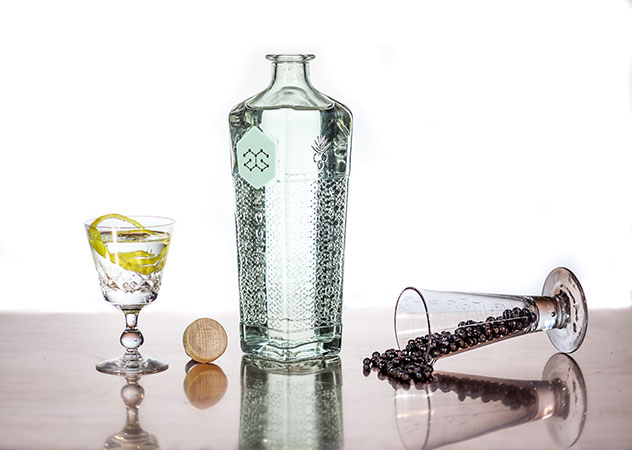
Jean-Baptiste Cristini joined forces with Mullineux wines to make the gin. Photo supplied.
Once a year he would distil 500 litres of sauvignon blanc into a fairly neutral wine spirit before redistilling it with traditional and Cape floral kingdom plants. Over four years he tweaked and experimented to perfect this process. It was at this point that Jean-Baptiste decided to take the leap and make this his career, joining forces with Mullineux Wines.
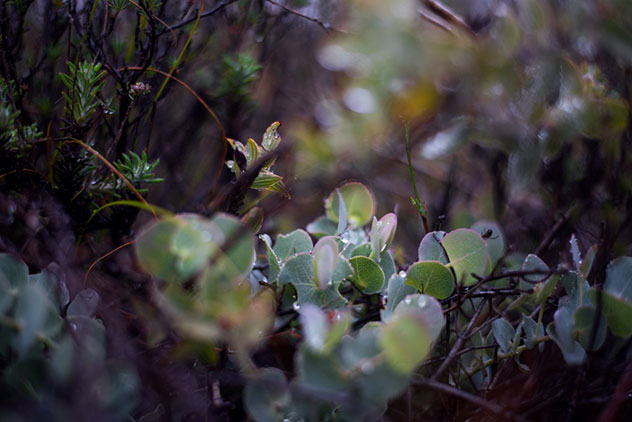
The majority of the botanicals in Geometric Gin are sourced from the mountains of the Western Cape. Photo supplied.
Botanicals from the Cape
The majority of the botanicals in Geometric Gin are sourced from the mountains of the Western Cape. Ingredients are picked from the immediate surroundings in small quantities to promote continued growth, and spices are sourced from local suppliers.
“The name came from Chris and Andrea (Mullineux),” explains Jean-Baptiste. “There is a species of critically endangered tortoises called the Geometric Tortoise that lives in lowland fynbos isolated within the mountains where the first botanicals for our gin were picked. The word geometric also donates structure and a sense of place. The bottle was based on a dark green, apothecary-like gin bottle from the 1800s that the Mullineuxs had found; we took that idea and evolved it with an art-deco feel, because art deco was based on a geometric interpretation of nature.”
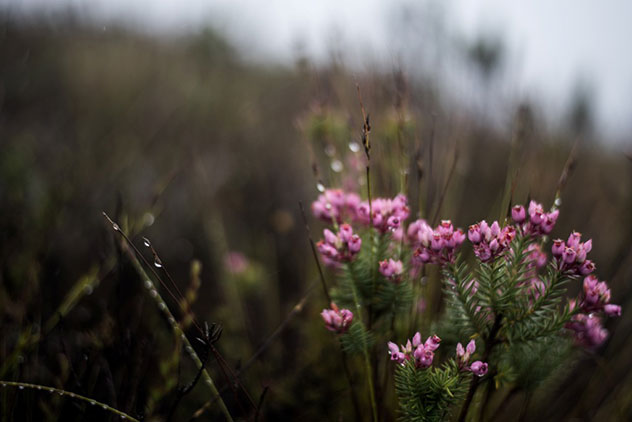
In addition to juniper, citrus and cardamom, the gins display a touch of fynbos. Photo supplied.
Geometric gin is subtle and silk-like with hints of juniper, citrus and cardamom and a touch of fynbos – a post-modern perspective on classic Cape dry gin.
What’s boutique gin without a matching tonic?
But it doesn’t stop there. Jean-Baptiste has also created a range of exceptional tonic concentrates under the Symmetry label. “I spent weeks in Kasteelberg looking at the diversity and experimenting with the local plants,” explains Jean-Baptiste. “Initially I wanted make one tonic concentrate, but with the complex varieties of gins out there, trying to make just one to complement them all was impossible.”
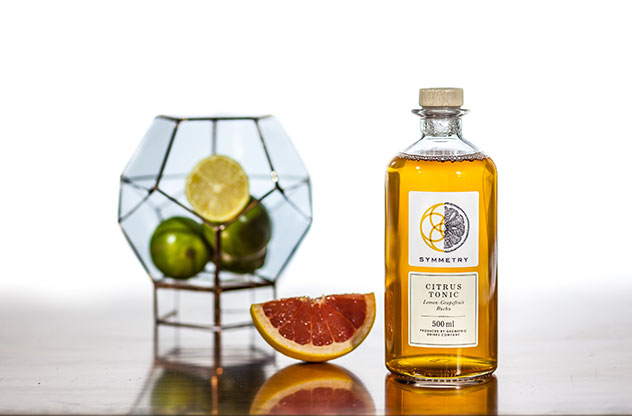
There are three Symmetry tonics to pair with the gin. Photo supplied.
In the end he settled on three: a buchu-based Citrus Tonic, a spice- and kapokbos-based Spice Tonic and a lavender-, chamomile- and rose pelargonium-based Floral Tonic.
When diluted with sparkling water they contain a quarter of the sugar of regular tonics, but don’t taste much less sweet. “It’s about the pursuit of balance: most tonics use a lot of quinine which then needs to be balanced with equally large quantities of sugar. We don’t use a huge amount of quinine; because we use cinchona bark, our balance is subtle: not too bitter and not too sweet. We tend to go towards extremes when we get excited about things and finding more complexity and subtlety in the middle ground is much harder, but it’s rewarding. I looked at the approach of how to bring bitterness and sweetness together by using other ingredients. Our tonics each contain 10 ingredients and quinine and sugar make up only two of those. That’s why I don’t call them Indian tonics, but rather botanical tonics.
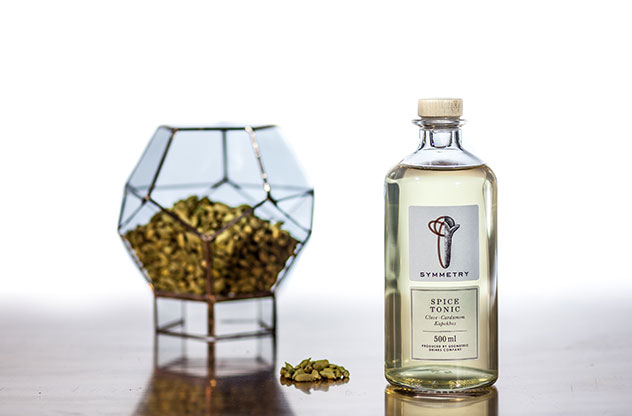
The spice and cardamom version. Photo supplied.
And next on the agenda?
Jean-Baptiste tells me we can look forward to a range of vermouths…
Where to find Geometric Gin and Symmetry Tonics
Online: Yuppiechef.com (stock from next week)
In Cape Town: Liquor City Claremont, Barkeeper, Queen and Peasant, Woodstock Liquors and Roeland Liquors.
In Johannesburg: Norman Goodfellows, Riverside Liquors and Liquor City Jan Smuts.
At restaurants: Symmetry Tonic is the preferred tonic served at The Test Kitchen with Hope on Hopkins TTK Gin. Symmetry Tonics are also served at Urbanologi in Johannesburg.
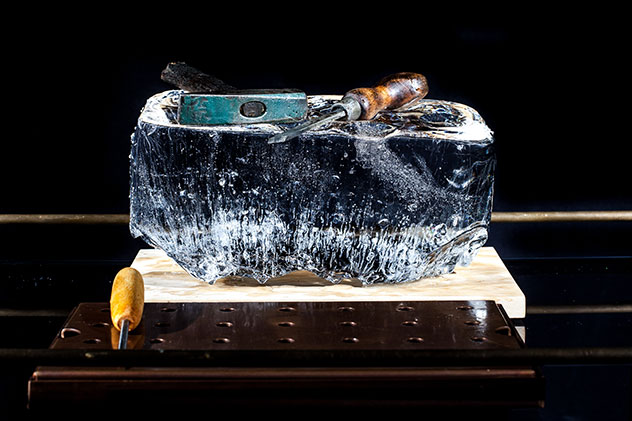
Anyone else feeling strangely thirsty? Photo supplied.












